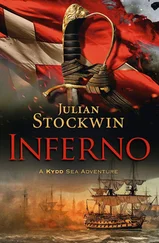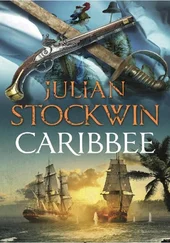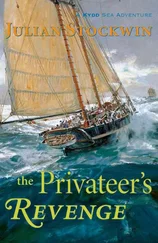Julian Stockwin - Quarterdeck
Здесь есть возможность читать онлайн «Julian Stockwin - Quarterdeck» весь текст электронной книги совершенно бесплатно (целиком полную версию без сокращений). В некоторых случаях можно слушать аудио, скачать через торрент в формате fb2 и присутствует краткое содержание. Жанр: Старинная литература, на английском языке. Описание произведения, (предисловие) а так же отзывы посетителей доступны на портале библиотеки ЛибКат.
- Название:Quarterdeck
- Автор:
- Жанр:
- Год:неизвестен
- ISBN:нет данных
- Рейтинг книги:4 / 5. Голосов: 1
-
Избранное:Добавить в избранное
- Отзывы:
-
Ваша оценка:
- 80
- 1
- 2
- 3
- 4
- 5
Quarterdeck: краткое содержание, описание и аннотация
Предлагаем к чтению аннотацию, описание, краткое содержание или предисловие (зависит от того, что написал сам автор книги «Quarterdeck»). Если вы не нашли необходимую информацию о книге — напишите в комментариях, мы постараемся отыскать её.
Quarterdeck — читать онлайн бесплатно полную книгу (весь текст) целиком
Ниже представлен текст книги, разбитый по страницам. Система сохранения места последней прочитанной страницы, позволяет с удобством читать онлайн бесплатно книгу «Quarterdeck», без необходимости каждый раз заново искать на чём Вы остановились. Поставьте закладку, и сможете в любой момент перейти на страницу, на которой закончили чтение.
Интервал:
Закладка:
"Minister, we shall look after our own. We have no need of a foreign power's intervention."
"Without a navy?" said Liston gently.
"Sir, this discussion is concluded." The President stood up. "Have you any other matter you wish to lay before me?"
"Thank you, Mr President. While we are in an understanding, may I be so bold as to refer you to the intolerable actions of French agents in arming bands of Indians on the Canadian border?"
That night the minister made his excuses to his wife and retired to the little room where he was accustomed to gathering his thoughts and rendering them lucidly for his master. Another hand would cipher the despatches.
He tested the nib of his quill, his mind ordering events into neat aggregations, then analysis to their natural heads. It was the least that was expected by Lord Grenville, King George's noble and demanding minister for foreign affairs.
Liston considered carefully: he had been ambassador to the United States for Britain in all but name during many of those turbulent years following the revolution and had acquired a respect for the colonials that bordered on liking. They had followed up their revolution with a constructive, well-considered constitution, which had humanity at its core; the French, even with the American example, had resorted to blood and chaos in an age-old lust for world domination.
There would be no elaborate salutations: Lord Grenville wanted meat in his despatches, personal observations and opinions unfettered by the delicacies of diplomatic language.
The first subject? The likelihood of intervention by America in the titanic world struggle that was reaching its peak. In Europe there was not a single nation of significance, save England, that still stood against France. America remained outside the fight, and as a neutral she could afford to; she was profiting immensely by trading across the interests of the belligerents—there would be little to gain in taking sides.
Yet the French were growing confident, arrogant even, in their dealings. New decrees had been issued by a victorious Directory in Paris that required all merchant ships to carry papers covering their cargo signed by a French consul if they were to escape being taken as a prize of war. There was even talk of an out-of-hand condemnation if British goods of any kind were found aboard.
If the French had the means to enforce this at sea it would have a devastating impact on the Americans. Without a navy, they would have no choice but to bow to French demands. In the end, though, Paris would find it never paid to bully the United States.
But would the Americans see this as cause for war? Some were still sentimentally attached to the British, and others saw French power as a threat that needed balancing. But there were those who remembered France as an ally closely involved in the birth of their nation and would never sanction an aggressive act against her.
Liston sighed. In the end, as always, it came back to politics and personalities in this most democratic of nations. He respected the bluff President, standing four-square for his country, plain-spoken and direct, even with his resolute opposition to British influences, but making no secret of his loathing of the French regime.
But he was increasingly isolated: his party, the Federalists, were the patricians, old landowners staunchly in favour of central government—and generally took the British view. His opponents were the Republicans under Thomas Jefferson, who had no love for England and were mainly new money, naturalised immigrants and strongly pro-French.
The two parties were locked in bitter political strife, which Liston could perceive Adams was badly placed to handle. In this odd system his own Vice President, Jefferson, was leader of the opposing party and privy to who knew what murky political secrets. And he was gravely handicapped by the extremist Hamilton at his elbow, splitting his party and draining confidence from his administration.
It was a fevered time: mobs were marching at night, shattering windows; newspapers were full of wild rumour and acid attack. He wondered briefly what Adams would say if he told him that such was his concern, the great George Washington himself was in secret communication with London. From Pennsylvania a deputation had even demanded clarity on the matter of Mr Adams, son of the President, who was said to be betrothed to a daughter of the King of Great Britain and thereby for the same General Washington to hold the United States in trust for the King.
There was an even chance of an alliance—but as the French depredations increased so must the Americans' grudging tolerance of British measures at sea. If the Royal Navy could be induced to grasp the delicacy of their position, there was a chance . . .
With a large white flag streaming from a halliard, Tenacious 's pinnace sailed towards the shore, Lieutenant Kydd in the stern-sheets, Midshipman Rawson at the tiller.
It was unfair: Kydd knew next to nothing about the United States and even less about the international law with which he had been told to threaten the local authorities if they did not drive the French back to sea. He was dressed in civilian clothes and unarmed, in accordance with convention when visiting a neutral country. In fact, he had been obliged to don his best rig, the dark green waistcoat and rust-coloured coat that Cecilia had taken such pains to find in Guildford. He held his light grey hat with its silver buckle safely on his knees.
As the low, wooded coast drew closer, Kydd saw the masts and yards of the French privateer beyond the point; it was clear that she was securing from sea. Further in, he made out a timber landing area, and around it a scatter of people.
The sprit-sail was brailed up and lowered, the oars shipped. "Head f'r the jetty," he growled.
Only one of the figures seemed to wear any semblance of a uniform but a number carried what appeared to be muskets. Kydd braced himself: he was going as a representative of his country and he would not be found wanting in the article of military bearing.
A couple of hundred yards from shore Rawson put the tiller over to make the final run in. Suddenly there was the unmistakable report of a flintlock and a gout of water kicked up sharply, dead in line with the bow.
"Wha'? God rot 'em, they're firing on a white flag!" Kydd spluttered. "Keep y'r course, damn you!" he flung at the midshipman.
The people ashore gesticulated and shouted. One levelled his gun in Kydd's direction. "S-sir, should we — " hissed Rawson.
"Take charge o' y'r boat's crew," Kydd replied savagely. Ashore the weapon still tracked Kydd and then it spoke. The bullet spouted water by the stroke oar, followed by a wooden thump as it struck the boat below where Kydd sat.
"Sir?"
"Keep on, damn y'r blood!" snapped Kydd. Even these ignorant backwoodsmen would know they'd be in deep trouble with their government if they caused loss of life by firing on a flag of truce.
More long guns came on target. There was a flurry of shouting, then the weapons were lowered slowly. Grim-faced, Kydd saw the waiting figures resolve to individuals.
"Garn back, y' English pigs!" yelled one, brandishing a rifle. Others took up the cry. Kydd told Rawson to hold steady and lay alongside. The shouting died down, but a dozen or more people crowded on to the jetty.
"Oars—toss oars," Kydd told the midshipman.
The crowd grew more menacing, one man threatening them with a pitch-fork. The boat drifted to a stop. "Bowman, take a turn o' the painter," Kydd ordered. The boat nudged the timbers of the landing-stage; hostile figures shuffled to the edge.
Kydd stood up in the boat. "I ask ye to let me land—if y' please." Nobody moved. "Then am I t' take it you're going to prevent by force the landing on the soil of the United States of America of a citizen of a nation, er, that you're not at war with?" It sounded legal, all but the last bit.
Читать дальшеИнтервал:
Закладка:
Похожие книги на «Quarterdeck»
Представляем Вашему вниманию похожие книги на «Quarterdeck» списком для выбора. Мы отобрали схожую по названию и смыслу литературу в надежде предоставить читателям больше вариантов отыскать новые, интересные, ещё непрочитанные произведения.
Обсуждение, отзывы о книге «Quarterdeck» и просто собственные мнения читателей. Оставьте ваши комментарии, напишите, что Вы думаете о произведении, его смысле или главных героях. Укажите что конкретно понравилось, а что нет, и почему Вы так считаете.









